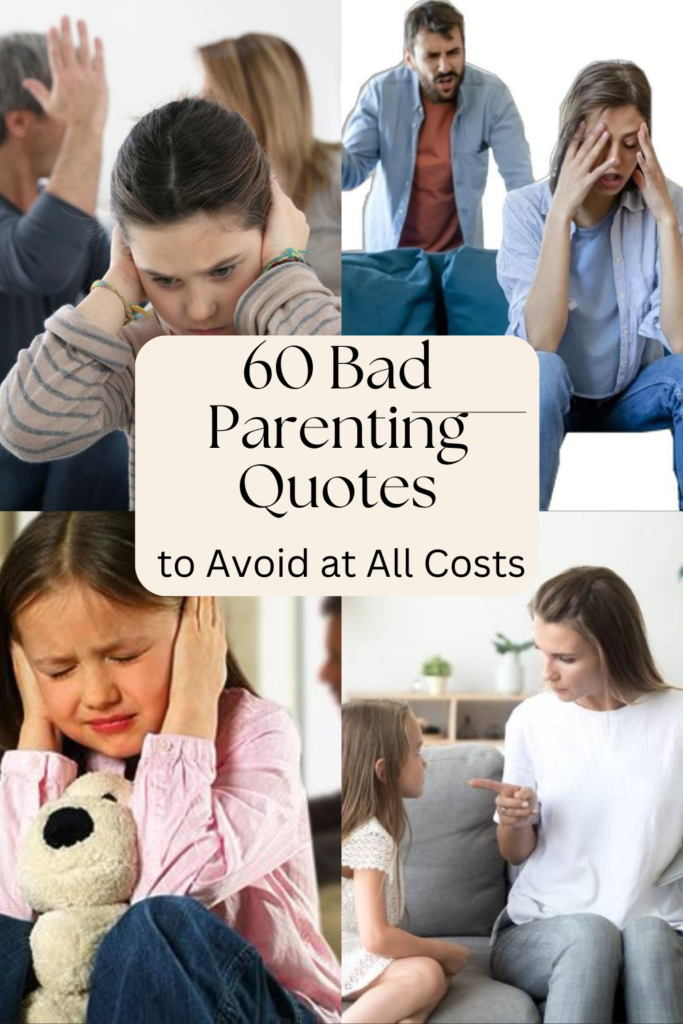In this article, we explore 60 bad parenting quotes to avoid at all costs, delving into why they are damaging and how they can affect a child’s development. By understanding the impact of these phrases, parents can make more mindful choices in their communication, ensuring their words build up rather than tear down. Let’s dive into these quotes and learn how to replace them with positive, empowering alternatives.
Parenting is one of the most challenging yet rewarding roles in life. While every parent strives to do their best, certain phrases and attitudes can have a lasting negative impact on a child’s emotional and psychological well-being. Words have power, and what parents say can shape a child’s self-esteem, confidence, and worldview. Unfortunately, some phrases, often spoken in moments of frustration or stress, can leave deep scars. Recognizing and avoiding these harmful quotes is crucial for fostering a healthy, loving, and supportive environment for your child.
Harmful Parenting Phrases You Should Never Say to Your Child
- “Why can’t you be more like your sibling?”
Comparing children to their siblings fosters jealousy, resentment, and low self-esteem. It creates a sense of inadequacy and damages sibling relationships. Instead, celebrate each child’s unique strengths and encourage them to support one another.
- “You’re so lazy!”
Labeling a child as lazy undermines their motivation and self-worth. It discourages effort and reinforces negative self-perception. Instead, try to understand the root cause of their behavior and offer encouragement to help them improve.
- “Stop crying, or I’ll give you something to cry about!”
This dismisses a child’s emotions and teaches them to suppress their feelings, leading to emotional repression and difficulty in expressing themselves. Instead, validate their emotions and help them process what they’re feeling.Credit @Olivia (Mummy-Time) - “You’ll never amount to anything.”
Such harsh criticism crushes a child’s confidence and ambition, making them doubt their potential and abilities. Instead, focus on their strengths and encourage them to pursue their passions.
- “Because I said so!”
This authoritarian response shuts down communication and discourages critical thinking. It teaches children to obey blindly rather than understand. Instead, explain the reasoning behind your decisions to help them learn.Credit @Insight State - “You’re such a disappointment.”
This phrase deeply wounds a child’s self-esteem and creates a fear of failure, making them feel unworthy of love and acceptance. Instead, offer constructive feedback and remind them that mistakes are part of learning. - “I wish you were more like [someone else].”
Comparing a child to others makes them feel inferior and unloved for who they are. Instead, celebrate their individuality and encourage them to be the best version of themselves. - “You’re too sensitive.”
Invalidating a child’s emotions teaches them that their feelings don’t matter, leading to emotional suppression. Instead, acknowledge their feelings and help them navigate their emotions. - “You’re useless.”
This harsh criticism destroys a child’s self-worth and makes them feel incapable and insignificant. Instead, focus on their efforts and help them build confidence in their abilities. - “I do everything for you, and this is how you repay me?”
Guilt-tripping a child creates feelings of obligation and resentment rather than genuine gratitude. Instead, teach them the value of kindness and appreciation through positive reinforcement. - “You’re just like your [negative trait] parent.”
Comparing a child to a disliked family member fosters insecurity and self-doubt. Instead, focus on their unique qualities and help them develop their own identity. - “You’re so stupid!”
Name-calling damages a child’s self-esteem and creates a negative self-image. Instead, offer constructive feedback and encourage them to learn from their mistakes. - “I don’t have time for this.”
Dismissing a child’s needs or concerns makes them feel unimportant and neglected. Instead, make time to listen and show them that their feelings matter. - “You’re embarrassing me.”
Shaming a child for their behavior in public humiliates them and damages their self-confidence. Instead, address the behavior privately and guide them toward better choices. - “You’ll never understand.”
This dismissive phrase discourages curiosity and makes a child feel inadequate. Instead, take the time to explain things in a way they can understand. - “I’m done with you.”
Threatening to withdraw love or support creates anxiety and fear of abandonment. Instead, reassure them of your love, even when they make mistakes. - “You’re too young to understand.”
Dismissing a child’s perspective undermines their intelligence and curiosity. Instead, encourage their questions and help them learn. - “You’re always causing trouble.”
Labeling a child as troublesome reinforces negative behavior and self-perception. Instead, address the behavior and help them find positive ways to express themselves. - “Why can’t you just be normal?”
This phrase makes a child feel like they don’t belong or aren’t good enough as they are. Instead, celebrate their uniqueness and help them embrace their individuality. - “You’re such a burden.”
Making a child feel like a burden creates guilt and a sense of unworthiness. Instead, show them that they are valued and loved. - “You’re not trying hard enough.”
This dismisses a child’s efforts and discourages perseverance. Instead, acknowledge their hard work and encourage them to keep going. - “I don’t care what you think.”
Invalidating a child’s opinions teaches them that their voice doesn’t matter. Instead, listen to their thoughts and encourage open communication. - “You’re too fat/skinny.”
Criticizing a child’s appearance leads to body image issues and low self-esteem. Instead, focus on their health and well-being, not their appearance. - “You’re always wrong.”
This phrase undermines a child’s confidence and discourages them from trying. Instead, help them learn from their mistakes and celebrate their efforts. - “You’re not my child when you act like this.”
Conditional love creates fear and insecurity in a child. Instead, reassure them of your love, even when they make mistakes. - “You’re such a failure.”
This harsh criticism crushes a child’s spirit and ambition. Instead, focus on their efforts and help them build resilience. - “You’re not good enough.”
This phrase makes a child feel inadequate and unworthy of love. Instead, celebrate their strengths and encourage them to keep trying. - “You’re always the problem.”
Blaming a child for everything creates guilt and self-doubt. Instead, address the behavior and help them find solutions. - “You’re too much to handle.”
This makes a child feel like a burden and damages their self-worth. Instead, show them patience and understanding. - “You’re not smart enough.”
Undermining a child’s intelligence discourages learning and growth. Instead, encourage their curiosity and help them develop their skills. - “You’re so annoying.”
This dismissive phrase makes a child feel unwanted and unloved. Instead, address the behavior and show them kindness. - “You’re always in the way.”
Making a child feel like a nuisance creates insecurity and self-doubt. Instead, show them that they are valued and loved. - “You’re not worth it.”
This phrase destroys a child’s self-esteem and sense of worth. Instead, show them that they are loved and appreciated. - “You’re such a liar.”
Accusing a child of lying without evidence damages trust and self-respect. Instead, address the behavior and help them understand the importance of honesty. - “You’re always causing problems.”
This reinforces negative behavior and self-perception. Instead, address the behavior and help them find positive ways to express themselves. - “You’re not brave enough.”
Undermining a child’s courage discourages them from taking risks. Instead, encourage them to face their fears and celebrate their efforts. - “You’re too slow.”
Criticizing a child’s pace creates frustration and self-doubt. Instead, show patience and encourage them to take their time. - “You’re not pretty/handsome enough.”
This phrase leads to body image issues and low self-esteem. Instead, focus on their inner qualities and help them build confidence. - “You’re always making mistakes.”
Focusing on mistakes discourages a child from trying new things. Instead, help them learn from their mistakes and celebrate their efforts. - “You’re not loved when you act like this.”
Conditional love creates fear and insecurity. Instead, reassure them of your love, even when they make mistakes. - “You’re such a crybaby.”
Mocking a child’s emotions teaches them to suppress their feelings. Instead, validate their emotions and help them process what they’re feeling. - “You’re not important.”
This phrase makes a child feel insignificant and unloved. Instead, show them that they are valued and appreciated. - “You’re always the last one.”
Comparing a child to others fosters insecurity and self-doubt. Instead, celebrate their efforts and encourage them to keep trying. - “You’re not capable.”
Undermining a child’s abilities discourages effort and growth. Instead, encourage their curiosity and help them develop their skills. - “You’re always causing trouble.”
This reinforces negative behavior and self-perception. Instead, address the behavior and help them find positive ways to express themselves. - “You’re not worth my time.”
This phrase makes a child feel neglected and unimportant. Instead, make time to listen and show them that their feelings matter. - “You’re not strong enough.”
Undermining a child’s strength discourages resilience. Instead, encourage them to face their fears and celebrate their efforts. - “You’re always wrong.”
This phrase undermines a child’s confidence and discourages effort. Instead, help them learn from their mistakes and celebrate their efforts. - “You’re not good at anything.”
This harsh criticism crushes a child’s self-esteem. Instead, focus on their strengths and encourage them to keep trying. - “You’re not my child when you act like this.”
Conditional love creates fear and insecurity. Instead, reassure them of your love, even when they make mistakes. - “You’re always the problem.”
Blaming a child for everything creates guilt and self-doubt. Instead, address the behavior and help them find solutions. - “You’re too much to handle.”
This makes a child feel like a burden and damages their self-worth. Instead, show them patience and understanding. - “You’re not smart enough.”
Undermining a child’s intelligence discourages learning and growth. Instead, encourage their curiosity and help them develop their skills. - “You’re so annoying.”
This dismissive phrase makes a child feel unwanted and unloved. Instead, address the behavior and show them kindness. - “You’re always in the way.”
Making a child feel like a nuisance creates insecurity and self-doubt. Instead, show them that they are valued and loved. - “You’re not worth it.”
This phrase destroys a child’s self-esteem and sense of worth. Instead, show them that they are loved and appreciated. - “You’re such a liar.”
Accusing a child of lying without evidence damages trust and self-respect. Instead, address the behavior and help them understand the importance of honesty. - “You’re always causing problems.”
This reinforces negative behavior and self-perception. Instead, address the behavior and help them find positive ways to express themselves. - “You’re not brave enough.”
Undermining a child’s courage discourages them from taking risks. Instead, encourage them to face their fears and celebrate their efforts. - “You’re too slow.”
Criticizing a child’s pace creates frustration and self-doubt. Instead, show patience and encourage them to take their time.






